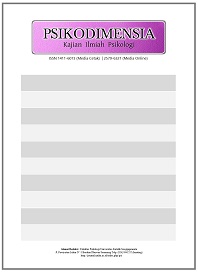Integrasi Teknik Centering dan Empty Chair untuk Meningkatkan Kemampuan Regulasi Emosi pada Individu dengan Sindrom Asperger
Abstract
Abstrak
Penelitian ini bertujuan menguji teknik centering dan empty chair yang diintegrasikan untuk meningkatkan kemampuan regulasi emosi pada individu dengan Sindrom Asperger (SA). Metode yang digunakan adalah studi kasus dengan subjek seorang laki-laki berusia 24 tahun yang memiliki Sindrom Asperger. Subjek mengalami kesulitan dalam mengelola berbagai emosi yang intens dirasakan, diantaranya marah, sedih, dan cemas. Subjek juga menunjukkan gejala depresi, kecemasan, dan distress yang signifikan. Peneliti menggunakan teknik centering dan empty chair secara terintegrasi. Centering dilaksanakan sebanyak 4 sesi dan empty chair sebanyak 2 sesi dalam kurun waktu 6 minggu (1 sesi tiap minggu). Secara kuantitatif, skor depresi, kecemasan, dan distress subjek mengalami penurunan. Adapun berdasarkan feedback dari subjek, centering dirasa membantu subjek untuk meregulasi emosinya dan meningkatkan penerimaan terhadap kondisi saat ini. Empty chair membantu subjek untuk mengekspresikan emosi dan melakukan resolusi konflik secara lebih adaptif. Berdasarkan hasil penelitian dapat disimpulkan bahwa teknik centering dan empty chair efektif untuk meningkatkan kemampuan regulasi emosi pada subjek penelitian yang memiliki SA.
Kata kunci: Centering, Empty Chair, Sindrom Asperger
Abstract
This study aims to exam integrated centering and empty chair techniques to improve emotion regulation capabilities in individuals with Asperger Syndrome. The study used a case study method with the subject of a 24-year-old man with Asperger Syndrome. Subject had difficulty managing various intense emotions, including anger, sadness, and anxiety. Subject also showed significant symptoms of depression, anxiety, and distress. Researchers used integrated centering and empty chair techniques. Centering was held as many as 4 sessions and empty chair as many as 2 sessions within a period of 6 weeks (1 session per week). Quantitatively, the subject' depression, anxiety, and distress scores decreased. Based on feedback from the subject, centering helped him regulate his emotions and increase acceptance of the current condition. Empty chairs could help the subject express emotions and perform conflict resolution more adaptively. These results show that the centering and empty chair techniques are effective in improving emotional regulation abilities in subject with Asperger Syndrome.
Keywords: Centering, Empty Chair, Asperger Syndrome
Keywords
Full Text:
PDF (Bahasa Indonesia)References
AVSAR, V., & SEVİM, S. A. (2022). The Effectiveness of Cognitive Behavioral Therapy Including Updating the Early Life Experiences and Images with the Empty Chair Technique on Social Anxiety. International Journal of Assessment Tools in Education, 181–202. https://doi.org/10.21449/ijate.1062613
Brubacher, L. (2017). Emotionally focused individual therapy: An attachment-based experiential/systemic perspective. Person-Centered & Experiential Psychotherapies, 16(1), 50–67. https://doi.org/10.1080/14779757.2017.1297250
Byrne, G., & O’Mahony, T. (2020). Acceptance and commitment therapy (ACT) for adults with intellectual disabilities and/or autism spectrum conditions (ASC): A systematic review". Journal of Contextual Behavioral Science, 18, 247–255. https://doi.org/10.1016/j.jcbs.2020.10.001
Cachia, R. L., Anderson, A., & Moore, D. W. (2016). Mindfulness in Individuals with Autism Spectrum Disorder: a Systematic Review and Narrative Analysis. Review Journal of Autism and Developmental Disorders, 3(2), 165–178. https://doi.org/10.1007/s40489-016-0074-0
Cai, R. Y., Richdale, A. L., Dissanayake, C., Trollor, J., & Uljarević, M. (2019). Emotion regulation in autism: Reappraisal and suppression interactions. Autism, 23(3), 737–749. https://doi.org/10.1177/1362361318774558
Chen, Y.-F., Huang, X.-Y., Chien, C.-H., & Cheng, J.-F. (2017). The Effectiveness of Diaphragmatic Breathing Relaxation Training for Reducing Anxiety. Perspectives in Psychiatric Care, 53(4), 329–336. https://doi.org/10.1111/ppc.12184
Diamond, G. M., Shahar, B., Sabo, D., & Tsvieli, N. (2016). Attachment-based family therapy and emotion-focused therapy for unresolved anger: The role of productive emotional processing. Psychotherapy, 53(1), 34–44. https://doi.org/10.1037/pst0000025
Doll, A., Hölzel, B. K., Mulej Bratec, S., Boucard, C. C., Xie, X., Wohlschläger, A. M., & Sorg, C. (2016). Mindful attention to breath regulates emotions via increased amygdala–prefrontal cortex connectivity. NeuroImage, 134, 305–313. https://doi.org/10.1016/j.neuroimage.2016.03.041
Eifert, G. H., & Forsyth, J. P. (2005). Acceptance & Commitment Therapy for Anxiety Disorders. New Harbinger Publication, Inc.
Elliott, R., & Macdonald, J. (2021). Relational dialogue in emotion‐focused therapy. Journal of Clinical Psychology, 77(2), 414–428. https://doi.org/10.1002/jclp.23069
Elliott, R., & Shahar, B. (2017). Emotion-focused therapy for social anxiety (EFT-SA). Person-Centered & Experiential Psychotherapies, 16(2), 140–158. https://doi.org/10.1080/14779757.2017.1330701
Gerard, P. (2018). Evidence that low self-worth could be linked to anger and aggression in children with ASD. Cambridge Open-Review Educational Research e-Journal, 5(2018), 49–62.
Glisenti, K., Strodl, E., & King, R. (2018). Emotion‐focused therapy for binge‐eating disorder: A review of six cases. Clinical Psychology & Psychotherapy, 25(6), 842–855. https://doi.org/10.1002/cpp.2319
Gravetter, F. ., & Forzano, L. . (2011). Research Methods for the Behavioral Sciences. Wadsworth.
Greenberg, L. S. (2017). Emotion-focused therapy of depression. Person-Centered & Experiential Psychotherapies, 16(2), 106–117. https://doi.org/10.1080/14779757.2017.1330702
Hayman, E. L. (2016). Reducing verbal and physical aggression in elementary students with Autism Spectrum Disorder using the Aggression Replacement Training Program. In Dissertation Abstracts International: Section B: The Sciences and Engineering (Vol. 77, Issues 1-B). https://etd.ohiolink.edu/
Herrmann, I. R., Greenberg, L. S., & Auszra, L. (2016). Emotion categories and patterns of change in experiential therapy for depression. Psychotherapy Research, 26(2), 178–195. https://doi.org/10.1080/10503307.2014.958597
Hopper, S. I., Murray, S. L., Ferrara, L. R., & Singleton, J. K. (2019). Effectiveness of diaphragmatic breathing for reducing physiological and psychological stress in adults. JBI Database of Systematic Reviews and Implementation Reports, 17(9), 1855–1876. https://doi.org/10.11124/JBISRIR-2017-003848
Hourston, S., & Atchley, R. (2017). Autism and Mind–Body Therapies: A Systematic Review. The Journal of Alternative and Complementary Medicine, 23(5), 331–339. https://doi.org/10.1089/acm.2016.0336
López-Pérez, B., Ambrona, T., & Gummerum, M. (2017). Interpersonal emotion regulation in Asperger’s syndrome and borderline personality disorder. British Journal of Clinical Psychology, 56(1), 103–113. https://doi.org/10.1111/bjc.12124
Mlotek, A. E., & Paivio, S. C. (2017). Emotion-focused therapy for complex trauma. Person-Centered & Experiential Psychotherapies, 16(3), 198–214. https://doi.org/10.1080/14779757.2017.1330704
Muntigl, P., Chubak, L., & Angus, L. (2017). Entering chair work in psychotherapy: An interactional structure for getting emotion-focused talk underway. Journal of Pragmatics, 117, 168–189. https://doi.org/10.1016/j.pragma.2017.06.016
Pahnke, J., Hirvikoski, T., Bjureberg, J., Bölte, S., Jokinen, J., Bohman, B., & Lundgren, T. (2019). Acceptance and commitment therapy for autistic adults: An open pilot study in a psychiatric outpatient context. Journal of Contextual Behavioral Science, 13, 34–41. https://doi.org/10.1016/j.jcbs.2019.04.002
Price, C. J., & Hooven, C. (2018). Interoceptive Awareness Skills for Emotion Regulation: Theory and Approach of Mindful Awareness in Body-Oriented Therapy (MABT). Frontiers in Psychology, 9. https://doi.org/10.3389/fpsyg.2018.00798
Pugh, M. (2017). Chairwork in Cognitive Behavioural Therapy: A Narrative Review. Cognitive Therapy and Research, 41(1), 16–30. https://doi.org/10.1007/s10608-016-9805-x
Pugh, M. (2018). Cognitive Behavioural Chairwork. International Journal of Cognitive Therapy, 11(1), 100–116. https://doi.org/10.1007/s41811-018-0001-5
Pugh, M. (2019). A little less talk, a little more action: a dialogical approach to cognitive therapy. The Cognitive Behaviour Therapist, 12, e47. https://doi.org/10.1017/S1754470X19000333
Reyes, N. M., Pickard, K., & Reaven, J. (2019). Emotion regulation: A treatment target for autism spectrum disorder. Bulletin of the Menninger Clinic, 83(3), 205–234. https://doi.org/10.1521/bumc.2019.83.3.205
Robinson, A. (2018). Emotion-Focused Therapy for Autism Spectrum Disorder: A Case Conceptualization Model for Trauma-Related Experiences. Journal of Contemporary Psychotherapy, 48(3), 133–143. https://doi.org/10.1007/s10879-018-9383-1
Samson, A. C., Wells, W. M., Phillips, J. M., Hardan, A. Y., & Gross, J. J. (2015). Emotion regulation in autism spectrum disorder: evidence from parent interviews and children’s daily diaries. Journal of Child Psychology and Psychiatry, 56(8), 903–913. https://doi.org/10.1111/jcpp.12370
Santomauro, D., Sheffield, J., & Sofronoff, K. (2017). Investigations into emotion regulation difficulties among adolescents and young adults with autism spectrum disorder: A qualitative study. Journal of Intellectual & Developmental Disability, 42(3), 275–284. https://doi.org/10.3109/13668250.2016.1236240
Scarpa, A., & Reyes, N. M. (2011). Improving Emotion Regulation with CBT in Young Children with High Functioning Autism Spectrum Disorders: A Pilot Study. Behavioural and Cognitive Psychotherapy, 39(4), 495–500. https://doi.org/10.1017/S1352465811000063
Sedgewick, F., Hill, V., Yates, R., Pickering, L., & Pellicano, E. (2016). Gender Differences in the Social Motivation and Friendship Experiences of Autistic and Non-autistic Adolescents. Journal of Autism and Developmental Disorders, 46(4), 1297–1306. https://doi.org/10.1007/s10803-015-2669-1
Seen, A. T. H., Ahmad, N. S., & Khalid, N. F. (2021). Effect of Empty Chair Technique Towards Psychological Well-Being Individual Experiencing Grief: A Case Study. Jurnal Penyelidikan Sains Sosial, 4(10), 21–34.
Sizoo, B. B., & Kuiper, E. (2017). Cognitive behavioural therapy and mindfulness based stress reduction may be equally effective in reducing anxiety and depression in adults with autism spectrum disorders. Research in Developmental Disabilities, 64, 47–55. https://doi.org/10.1016/j.ridd.2017.03.004
Yokotani, K. (2018). Advantage of empty-chair dialogue over emotion-focused couples therapy for a Japanese couple with marital infidelity: A case study. International Journal of Brief Therapy and Family Science, 8(1), 34–48. https://doi.org/10.35783/ijbf.8.1_34
DOI: https://doi.org/10.24167/psidim.v21i1.4621
Print ISSN : 1411-6073 | online ISSN : 2579-6321 View My Stats

This work is licensed under a Creative Commons Attribution 4.0 International License.




















